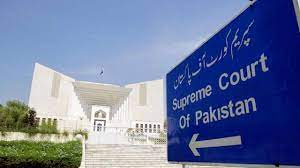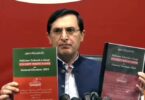ISLAMABAD (Agencies): In a unanimous verdict on Friday, the apex court ruled that the Supreme Court (Review of Judgments and Orders) Act 2023 was “unconstitutional”, dampening the hopes of ex-PM Nawaz Sharif and Jahangir Tareen who were seeking to challenge their lifetime disqualifications.
Both Nawaz and Tareen were disqualified under Article 62 of the Constitution by the SC. Had the verdict today been in favour of the petitions, both leaders would have gotten an opportunity to challenge their disqualifications, keeping in view their political ambitions amid the upcoming general elections in the country following the completion of the tenure of the National Assembly.
A three-member bench of the apex court headed by Chief Justice Umar Ata Bandial and comprising Justice Ijazul Ahsan and Justice Munib Akhtar had heard multiple petitions challenging the law, enacted in late May. Ghulam Mohiuddin, Zaman Khan Vardak, the Jurists Foundation, through its CEO Riaz Hanif Rahi, and the Pakistan Tehreek-e-Insaf (PTI) had challenged the vires of the act.
Attorney General for Pakistan (AGP) Mansoor Usman Awan had asked the court — during earlier hearings of the case — to dismiss the pleas, explaining that it broadens the court’s jurisdiction and does not curb its powers. However, PTI lawyer Ali Zafar, on behalf of the party’s Secretary General Omar Ayub, had maintained that a change in the apex’s powers could not be made through legislation alone and required a constitutional amendment.
On June 19 after six hearings — from June 7 to June 19 — the bench reserved its verdict. The CJP today read out the decision in the presence of the AGP, petitioners, and a large number of lawyers. “The Supreme Court Review Act is against the Constitution,” CJP Bandial said, adding that the verdict was passed unanimously.
The detailed 87-page long order struck down the Act as null and void and of no legal consequence. It said the Act is “repugnant to and ultra vires the Constitution […] being beyond the legislative competence of the Parliament.” Addressing the questions surrounding the maintainability of the petitions, the order stated: “Article 184 of the 1973 Constitution confers original jurisdiction on the Supreme Court.”
It further pointed out that “since the independence of the judiciary is a recognized salient feature of the 1973 Constitution and provisions of the 2023 Act prima facie appear to affect such independence, the instant Petitions raise questions of public importance within the contemplation of Article 184(3)of the Constitution.” “Further, any intrusion by any organ of the State in the independence of judiciary affects every citizen of the country and is therefore a question of great public importance,” it added. Moreover, the order said that the argument raised to the effect that the petitioners ought to have approached the high court under Article 199, was “misconceived”.
“This court has the unique constitutional mandate under Article 184(3) to directly entertain matters related to enforcement of fundamental rights which raise questions of public importance,” the order said. The order added that questions of public importance concerning the enforcement of fundamental rights can directly be raised by the Supreme Court.
Adding that the protection of fundamental rights was a duty of the judiciary, the order stated: “The 2023 Act is an intrusion in the basic and fundamental feature of the Constitution namely the independence of the judiciary directly and undisputedly affects fundamental rights of citizens.” The order also brushed aside the AGP’s argument that no appeal or review is available against a judgment or order passed by this Court under Article 184(3), and the 2023 Act addressed such “mischief”. Terming this argument “flawed”, the order stated that considering the process followed by the court in passing such orders, “nothing was farther than the truth.”
The order further stated: “Parliament cannot legislate regarding any matter relating to jurisdiction and powers of the Supreme Court.” Moreover, the bench in its order contended that “any legislation … under the garb of “enlargement of [the] jurisdiction of the Supreme Court”, is indisputably an intrusion in the independence of the judiciary.”







